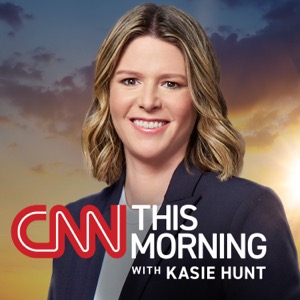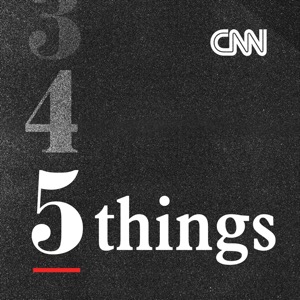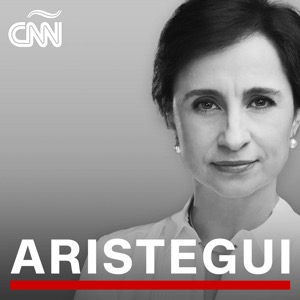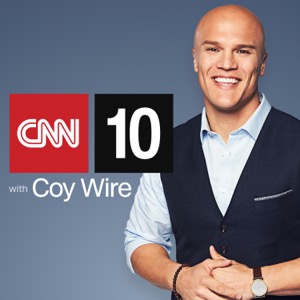podcast
CNN One Thing
You’ve been overwhelmed with headlines all week – what's worth a closer look? One Thing takes you into the story and helps you make sense of the news everyone's been talking about. Every Wednesday and Sunday, host David Rind interviews one of CNN’s world-class reporters to tell us what they've found – and why it matters. From the team behind CNN 5 Things.
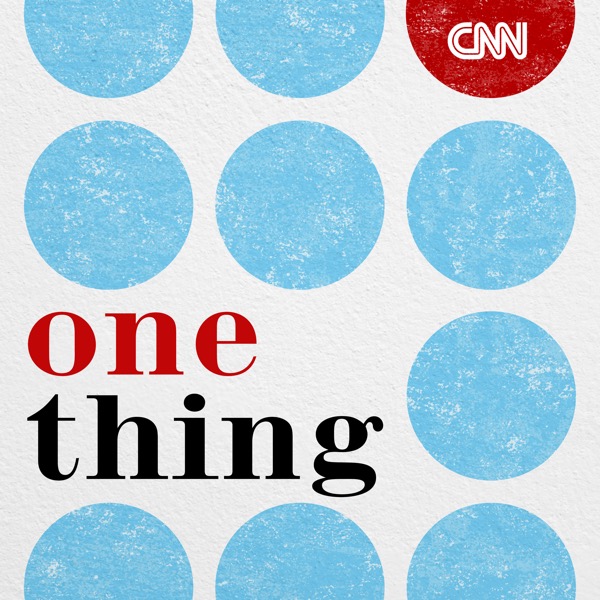
Understanding the Latino Vote
CNN One Thing
Sep 29, 2024
Vice President Kamala Harris and former President Donald Trump are both working to mobilize Latinos, a crucial voting bloc. However, the nuances within the group are playing out in some unexpected ways. In this episode, we examine how both campaigns are crafting their messages and Trump’s (occasionally awkward) embrace of reggaeton stars.
Guests: Katelina Eccleston, reggaeton historian & Cristina Beltrán, NYU associate professor
Episode Transcript
David Rind
00:00:00
Usually it's not a good idea to get into the prediction business when it comes to presidential elections. But with just 37 days to go, there are a few things we can be pretty sure about. One, we should all be prepared not to have a projected winner on election night. Rules in certain states about when officials can start processing mail in ballots could really delay that call. Two it appears this is going to be extremely close. Just take our most recent CNN poll from earlier this week.
Jake Tapper
00:00:35
Among likely voters nationwide, 48% say they support Harris, 47% say they support Trump. That's within the three percentage point margin of error. So the two are virtually tied.
David Rind
00:00:45
But as you dig deeper, you'll find some nuance in the numbers. For example, 60% of Harris supporters say they are voting for her, then against Trump. There's some fresh enthusiasm there. But Harris still trails Trump on issues like the economy and immigration.
David Chalian
00:01:05
Who do you trust to handle the issue better? 49% say Trump. 35%. Harris. That's a 14 percentage point gap there.
David Rind
00:01:14
And while polls show a majority of Latino voters still plan to vote for Harris, remember, Trump made gains with that group in 2020. So the question is, will that trend continue? Today, the nuances of the growing Latino vote, why Democrats are rethinking how they target the population. Plus, how community dynamics and the rhythms of reggaeton may influence the outcome. From CNN this is One Thing. I'm David Rind.
Former President Donald Trump
00:01:53
And two amazing Puerto Rican musical legends. They're legends. Justin, Keyleth and unwell. Do you know who they are? Do you know who the hell they come up here?
David Rind
00:02:06
When former President Donald Trump brought up those two reggaeton stars on stage at a rally in Johnstown, Pennsylvania, last month. The way he introduced them raised some eyebrows in the Latino community. But the way he introduced an even bigger musician a few weeks later in Las Vegas was even more awkward.
Former President Donald Trump
00:02:25
Latin music superstar Nicky Jam. Do you know Nicky? She's hot. Where is Nicky? Where is Nicky?
David Rind
00:02:34
That's because the "she" Trump was referring to is actually a "he." Oh, look. I'm glad he came up.
Nicky Jam
00:02:47
It's honor to me to meet you, Mr. President.
Katelina Eccleston (Gata)
00:02:52
It really was a slap in the face.
David Rind
00:02:54
This is Katelina Eccleston. She goes by Gata. She's a reggaeton historian and creator of the platform reggaeton con la Gata. She says it was a huge deal for Nicky Jam to embrace Trump, because jam in the past had spoken out in support of DACA recipients. The program Trump tried to end back when he was president got to says this touched a nerve with other Latino musicians, too, like the Mexican rock group Maná.
Katelina Eccleston (Gata)
00:03:20
They pulled down a song from from all streaming platforms that they had in collaboration with Nicky Jam. And they put on social media a statement that simply said Maná does not work with racists.
David Rind
00:03:32
And she says to understand why this was such a flash point among reggaeton fans. You have to understand the music itself.
Katelina Eccleston (Gata)
00:03:39
Reggaeton, the best way that I can describe it is as a fusion genre. You will hear, a boom chick boom type of beat.
Katelina Eccleston (Gata)
00:03:53
Complemented by, some pop, complemented by rhythms that are more ancestral, like bomba, which is, you know, native to Puerto Rico. You'll also hear lyrically, a lot of hip hop. It has been used as a medium of resistance throughout the course of history. Voice for, you know, the unheard. There may have been an initial mission with its creation in regards to being a medium of resistance. But since it has evolved and has reached, a larger audience and your fresher ears, you know, this sense of community that was there at in its beginnings, slowly but quickly dissipating as it becomes more popular?
David Rind
00:04:41
That's what I was wondering. Is there any concern or tension now that it's starting to be embraced by mainstream politicians as a way to kind of signal one way or the other on the campaign trail?
Katelina Eccleston (Gata)
00:04:52
I think it's a fact is, at the very least is very interesting. On one end, it's, you know, solidifying this sort of underground community of people who are honing in on what real reggaeton is and its, you know, political meanings and things of that nature. On the other end, you know, there's this sort of celebration because of these new highs that is reaching and these new barriers and, you know, the financial gain and benefit in the matter of which we're able to compete with other markets. Some people are willing to look past the political implications of endorsing political candidates like Trump for the sake of reggaeton growing.
David Rind
00:05:31
And perhaps no artist is more responsible for that growth than Bad Bunny. He's one of the most streamed artist in the world. Experts say an endorsement from him would be Taylor Swift. Level seismic. But gotta says don't expect one anytime soon.
Katelina Eccleston (Gata)
00:05:46
You know, I, I can't imagine him, to be quite honest, him endorsing either candidate. I simply can't imagine that at this point in time. Why? Because of his politics. Bad Bunny advocates for free. Puerto Rico for a Puerto Rico that is, you know, independent, Puerto Rico that, you know, respects its residents.
'Bad Bunny - Una Velita (Music)
00:06:17
Obviously the power will go out and only god knows if it’ll come back.The bridge they took forever to build, the overflowing river will tear it down
Katelina Eccleston (Gata)
00:06:18
And to be quite honest, both parties, they they have a lot of explaining to do.
'Bad Bunny - Una Velita (Music)
00:06:25
We need the Boricua to wake up.
David Rind
00:06:27
And that sentiment is something our reporters have heard from some Latino voters that they're not totally satisfied from what is being offered to them or how the candidates are selling it. And while Gata won't be voting for Trump in November, she's not satisfied with the alternative either.
Katelina Eccleston (Gata)
00:06:44
I'll be honest with you, David, I am I'm very disappointed. Very disappointed because, yes, I want to be celebrating the fact that, a black woman is a candidate from one black woman to the to the next. Like, I feel so incredibly happy that that Kamala is the candidate. But I'm also disappointed because I cannot be pander to. Yes, you have to work for not just my vote, but the the vote of every single person. It is an honor. It is is the highest honor to lead this country into the future, the highest honor. And it's one that no longer, you know, can be purchased with like, you know, promises that are not tangible.
David Rind
00:07:30
Will you be voting for her?
Katelina Eccleston (Gata)
00:07:31
I don't I don't think so. I don't think so. I hope she wins, but I don't. I don't think so. I cannot look past the detriment of what's going on in the Middle East, specifically in Palestine, I cannot.
David Rind
00:07:45
Does that mean just not voting, like not showing up on Election Day?
Katelina Eccleston (Gata)
00:07:49
I will not show up for her now.
David Rind
00:08:00
What do you make of this kind of outreach to celebrities?
Cristina Beltrán
00:08:04
Yeah, the danger of Trump doing that is a little bit like Gerald Ford biting into the tamales with the husk still on. It's like, you know, you don't you know, you're I don't think you know exactly who you're talking about.
David Rind
00:08:17
'This is Cristina Beltrán. She's an associate professor in the Department of Social and Cultural analysis at New York University. And I wanted to talk to her to get a better sense of this group as a whole. She says Latino voters represent a slice of the electorate that is growing super fast in 2020. It was about 32 million people. That's expected to reach 36 million by November. It's important to remember, though, that this group is not a monolith, and ethnic subgroups are represented in key battleground states like Puerto Rican communities in Pennsylvania or Mexican-Americans in Arizona. But which party they usually vote for? Maybe shifting a bit.
Cristina Beltrán
00:08:59
Historically, about 25% of the Latino vote is Republican. And then about 70, 65, 70% voting for, Democrats are sort of solidly Democratic. So, for example, a majority of Latinos, around 61% supported Joe Biden in 2020. And Hillary Clinton won a little bit more of that vote. However, Clinton's share was slightly lower than Obama's. Obama won about 71% of the Latino vote in 2012. So it's a historically predominantly Democratic but not, only Democratic. Not Democratic in the same way as say, the African American electorate.
David Rind
00:09:38
Right. And it does seem, you know, at least going from 2016 to 2020, a slide towards Trump, like, where is that coming from?
Cristina Beltrán
00:09:47
Right, right. So for example, when we talk about Trump, Trump won about 28% of Latinos voted for Trump in 2016, and then about 38% of Latinos supported him in 2020. So it was it was already a surprise in 2016 that he did as well as he did, because people thought certainly in 2016, given all the attacks on immigrants, some predictions were saying he's going to get like 12%. He's going to get really, really unusually low numbers. And the fact that he did pretty much exactly as well as Mitt Romney did in 2012 surprised people in 2016. And then I think after four years of Trump, people thought, oh, it's going to be worse. And in fact, he did better. I think this is for a couple of of reasons that I think we haven't discussed and thought enough about.
David Rind
00:10:43
We'll be right back. Before the break, you said there were some under discussed reasons why Latinos may have been more interested in voting for Donald Trump in recent years. What are they?
Cristina Beltrán
00:11:07
One of them, to me that seems deeply important is. Latinos are a population that are simultaneously victims of dangerous and violent and over militarized border security policies.
David Rind
00:11:23
Tension in areas with high migrant populations. Stress.
Cristina Beltrán
00:11:27
Migraine days. It's very stressful. It's like you have a disease that's killing you like cancer. Something that makes you feel desperation.
David Rind
00:11:35
Immigration rates started Sunday, according to a senior administration official. Ice agents are focused on about 2000 people who've been ordered to leave the country.
Cristina Beltrán
00:11:44
Their priorities experience the deportation and detention machinery of the United States in very intense ways, and it affects families and communities. But something that we didn't, I think, think nearly enough about, and that I've written a little bit about, is, is the fact that we also are the employees of the Homeland Security state.
'Bad Bunny - Una Velita (Music)
00:12:03
They have just been incredible with the operation that they showed me is nothing less than incredible. And I'll say this, it's a military operation. I mean, we have a million. This is like a war.
Cristina Beltrán
00:12:16
And since 2001, the. As the border has grown, as the border has become more militarized, as the border has become hardened and staffed by a larger and larger population of Americans working for it in the same way that as America's policing has gotten intensified over the years, since 9/11, since 2001, this is having an impact on Latino populations, right? Latinos work for the very, organizations that are doing both, you know, harm, but also are servicing and serving those communities or working in the border regions. So I think that's a really important issue, is there are now a lot more Latinos who understand their own bread and butter, their own pensions, their own lives are connected to the border in ways that are very different than they were, say, in 1999.
David Rind
00:13:05
That's really interesting. So when Trump is promising a mass deportation program, you're saying that that may not, you know, hit quite as deep because there are people that would presumably be helping carry that out?
Cristina Beltrán
00:13:21
'Yeah. I mean, I think it's I think it's a combined situation that I think sometimes we don't think about when we talk about immigration. One issue that often when we talk about the importance of immigration for Latinos, it is a critical issue and it affects different segments of this population very profoundly. But when it comes to voting, citizens are voters, right? So the questions of of changes in immigration policy are somewhat abstract or somewhat, if not abstract, somewhat distanced from Latinos who are voters because Latinos who vote already have citizenship. So I think that when it comes to immigration, you have people who are Latino, who have family members, in their own families, who are non-citizens. But you also have family members who are employed in the Border Patrol, or family members who are third generation, who also think that there's too much immigration or that it needs to be regularized, or that think that their families, their family members came in the right way and people today are coming in the wrong way. So you're having debates at a lot of levels. And for voters, that's a discussion among people with already existing citizenship, which is a different conversation than the one that's also happening across the United States of people who are green card holders or who are non-citizens, who are feeling the violence of the immigration system, in different ways that are much more intimate.
David Rind
00:14:41
Right. And this has been kind of the pitch from Democrats in years past preaching these progressive messages to protect the dreamers and those kind of folks. But I want to ask about that, because there was some reporting in Politico earlier this week about how the Harris campaign wants to move away from identity politics, not explicitly talking about race and also talking tougher about border security. In fact, she visited the border in Arizona on Friday. So what do you make of that approach?
Cristina Beltrán
00:15:11
Right. I think it's fascinating. And I think it's I think it's it can be could be potentially very, very smart in the sense that, as we know, Harris herself doesn't talk often about her Black and South Asian American identity. Right, right. And, so the fact that she's not talking to Latinos about that in the same way, and I think that's in part because as a woman of color, she understands that people often don't like to be reduced to their racial or gender identities. Right? We want to say, hey, I'm more nobody likes to be reduced to just being their racial or gender identity. All of us are like, I'm more than that, right? And yet our racial and gender identities matter in the world. And to us.
Speaker 5
00:15:49
We need to lower the cost of health care and continue to take on big pharma and cast the the cap, the cost of prescription medications. Yes, for our seniors, which we have done together, but for all Americans, because when we look at drugs like insulin, everyone here knows, first of all, Latinos are 70% more likely to be diagnosed with diabetes. And with the support of CHC, we were able to cap the cost of insulin at $35 a month for seniors.
Cristina Beltrán
00:16:18
So finding a way to talk about that, I think, matters. And it requires, you know, not just having racial surrogates, but it requires talking to people about the many issues that exceed race, that exceed gender, that also move people. So I think she's her own experience with negotiating identity and her and her staff. I think it's interesting that they're realizing that it's going to be about sort of slicing up these electoral communities and thinking about, okay, when I go to the border, you know, there's a there's a political culture that has been shaped by border enforcement. And so I'm going to speak to those, voters in a particular way.
Speaker 5
00:16:58
We must also reform our broken immigration system. And protect our dreamers and understand we can do both. Create an earned pathway to citizenship and ensure our border is secure. We can do both. And we must do both.
Cristina Beltrán
00:17:20
'That's going to be different than, say, going to Northern California and speaking to Latino voters there, which has a different kind of progressive cultural orientation. I might need to talk to Latino voters there and talk about climate change or talk about abortion rights. Frankly, you have to start talking to Latino voters the way you talk to white voters, which involves a lot more micro-targeting and a lot more specificity.
David Rind
00:17:42
Do we have a sense in this group how many people are undecided and, you know, truly persuadable one way or the other?
Cristina Beltrán
00:17:52
'Yeah, I think I mean, some of what the polling has been showing is that the populations that are the most undecided are younger, black and brown, often non-college educated. So I think that those are populations that are and that are periodic voters because they're younger voters and they're periodic voters, frankly, because neither party has invested nearly enough in the work of turning nonvoters into voters.
David Rind
00:18:20
Is that a function of enthusiasm, like not being jazzed or feeling like both options don't kind of suit them? Or is it an infrastructure thing where they just, like, don't know where the resources are to actually get on the rolls and things like that?
Cristina Beltrán
00:18:36
It's a whole series of of issues. It's harder to turn nonvoters into voters who are young, who don't have college degrees and poorer populations, more working class populations. Those are all things that make it hard to get people to vote. And Latinos as a group fit into those populations at higher numbers. So I think often there just hasn't been the kind of deep outreach. Whereas I think if you're a voter in Pennsylvania, right, or Wisconsin and you're Latino, you might get more, efforts made to mobilize those voters. So I don't think it's a lack of interest or a kind of passivity, any more than there's a lack of interest or passivity among all voters under 25 who have been feeling frustrated by the choices they've been given. Really, since Barack Obama ran.
David Rind
00:19:22
What about the Puerto Rican population? It's not a huge, huge number, but Donald Trump has a history with that group, and they do live in areas of Pennsylvania, for example, that could make a difference.
Cristina Beltrán
00:19:34
It's fascinating because, you know, he was so Trump was so offensive and did so much damage during Hurricane Maria and its aftermath.
'Bad Bunny - Una Velita (Music)
00:19:44
I hate to tell you, Puerto Rico, but you've thrown our budget a little out of whack because we've spent a lot of money on Puerto Rico, and that's fine. We've saved a lot of lives. If you look at the.
Cristina Beltrán
00:19:54
'And yet what I think surprised a lot of, even Latino, politics scholars was that a lot of those Puerto Ricans who then moved to places like Miami, moved to different parts of Florida, Tampa, etc. there was a I remember I was thinking, oh, this generation of Puerto Rican sort of, you know, folks fleeing the island because of the damage done there. These are going to be these anti-Trump.
David Rind
00:20:22
Voters, right? Like they'll never vote for Trump ever again.
Cristina Beltrán
00:20:25
'Yeah, they're going to after what they experienced watching him throw, you know, towels at them. It was so offensive and so appalling and materially so appalling, really thinking, oh, these people will never vote for Trump. And then Florida Latinos as a group did sort of shift over to Trump. And that was sort of solidified again in 2022, in the midterms. And so I think what it teaches us is that, again, there's a lot of cross-cutting dynamics that happen to voters. I'm sure there were many Puerto Rican voters in Florida who remember Hurricane Maria and did not vote for Trump and voted for Democrats and would never vote for Trump. However, there are also a lot of Puerto Rican voters who moved to Florida and when they moved to Florida and they're in Miami or, or Hialeah or wherever, they enter into a conservative political ecosystem of conservative Latinos. Right. There's a conservative political ecosystem that they entered into and that that also in the kind of media they listen to and the the cult, the cultural spaces they just end up inhabiting. Those have an impact on people's politics. If a voter moves into, you know, Houston and moves into Los Angeles or San Francisco, that affects you. So I often think that less ideologically attached voters are what I call sort of political tofu. Like they sort of and this is true of a lot of undecided and less political voters. When they enter into a certain cultural or political ecosystem, they can start to sort. Become oriented based on the ecosystem they inhabit. And Florida is a very conservative Latino cultural ecosystem. And Puerto Rican voters, I think, also got pulled into that story.
David Rind
00:22:16
Yeah. Just like any other group. Like what? The people you hang out with, the area of the country you're in, the social media you consume, it can all have an effect on all of it and how you feel about things.
Cristina Beltrán
00:22:26
Exactly, exactly.
David Rind
00:22:29
Well, Professor Beltran, this was totally fascinating. Thank you so much for your time.
Cristina Beltrán
00:22:34
Oh, sure. It was my pleasure. Thanks so much.
David Rind
00:22:41
And if you want to learn even more about the Latino vote and its role in this election, check out the whole story with Anderson Cooper Sunday night at 8 p.m. eastern on CNN. CNN political commentator Ana Navarro will take a deep dive through a tour across the country. Again, that's the whole story with Anderson Cooper Sunday at 8 p.m. eastern on CNN.
00:23:11
One Thing is a production of CNN Audio. This episode was produced by Paola Ortiz and me, David Rind. Our senior producers are Felicia Patinkin and Faiz Jamil. Matt Dempsey is our production manager. Dan Dzula is our technical director. And Steve Lickteig is the executive producer of CNN Audio. We get support from Haley Thomas, Alex Manasseri, Robert Mathers, John Dianora, Leni Steinhart, Jamus Andrest, Nichole Pesaru, and Lisa Namerow. Special thanks to Wendy Brundage and Katie Hinman. We'll be back on Wednesday. I will talk to you then.
